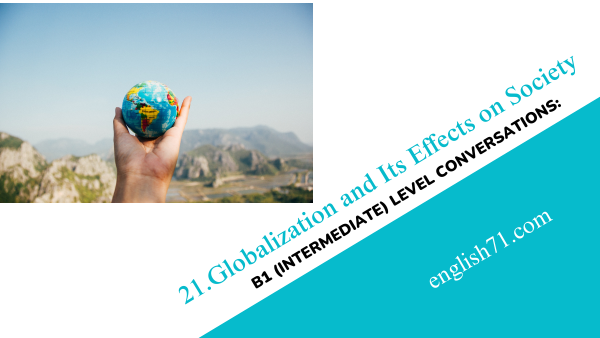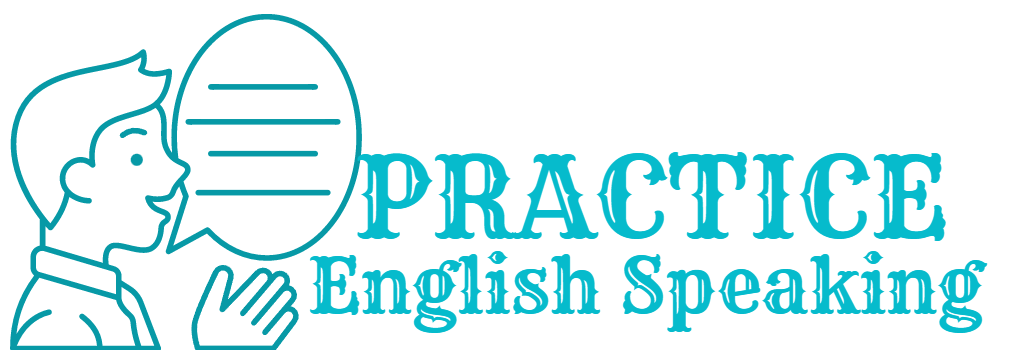B1(Intermediate) level Conversations: (21) Globalization and Its Effects on Society

Marie: Hi Andrew! Have you ever stopped to think about how much our world has changed due to globalization?
Andrew: Absolutely, Marie. It’s fascinating to see how interconnected our lives have become. But, you know, it’s not all sunshine and rainbows.
Marie: True. There are certainly challenges. One positive aspect, though, is the cultural exchange. We get to experience and appreciate diverse traditions from around the globe.
Andrew: You’re right. It’s like having the world at our fingertips. I can enjoy Japanese cuisine for lunch and stream a French movie in the evening.
Marie: Exactly! It broadens our perspectives and helps break down cultural barriers. But, on the flip side, some argue that this exchange leads to cultural homogenization. What are your thoughts on that?
Andrew: That’s a valid concern. With the dominance of Western media, there’s a risk of losing unique cultural identities. It’s essential to preserve and celebrate our differences.
Marie: Agreed. It’s crucial for societies to actively protect their cultural heritage. Now, let’s talk about the economic impact. Globalization has undeniably created economic opportunities, but it’s also been criticized for exacerbating inequality.
Andrew: The economic aspect is complex. While multinational corporations thrive, local businesses can struggle. It’s vital for policies to address this imbalance and ensure fair opportunities for all.
Marie: Absolutely. We need ethical business practices and policies that promote inclusive growth. Shifting gears, technology plays a massive role in globalization. It connects us instantly but also raises concerns about privacy and security.
Andrew: Technology is a double-edged sword. It empowers us, but we must find a balance between connectivity and safeguarding individual rights. Cybersecurity measures are more critical than ever.
Marie: Spot on, Andrew. And thinking about the positives again, the ease of communication has paved the way for global collaboration on issues like climate change and public health.
Andrew: That’s a great point. Tackling global challenges requires collective efforts. We’re in this together, and global cooperation is the key.
Marie: Absolutely. It’s about fostering a sense of global citizenship. However, it’s also important to address the fears and resistance some people have toward globalization, especially when it comes to job security.
Andrew: Change can be intimidating, and job displacement is a real concern. We need comprehensive policies that provide support and retraining opportunities for those affected.
Marie: Well said. Ultimately, navigating globalization requires a thoughtful and inclusive approach. It’s about embracing the positives while actively addressing the challenges.
Andrew: I couldn’t agree more, Marie. It’s an ongoing process, and with careful consideration, we can create a more balanced and interconnected world.
Marie: Thanks for sharing your insights, Andrew. It’s always enlightening to discuss these complex issues with you.
Andrew: Likewise, Marie. Let’s continue these conversations and contribute to a more informed and connected world.



Summary:
Marie and Andrew engage in a thoughtful conversation about the multifaceted impact of globalization. They touch on cultural exchange, economic opportunities, technological advancements, and the challenges posed by inequality and job displacement. The dialogue emphasizes the need for a balanced and inclusive approach to globalization, one that celebrates diversity, addresses economic imbalances, and fosters global cooperation to tackle shared challenges. Marie and Andrew advocate for policies that safeguard cultural identities, promote ethical business practices, and ensure the well-being of individuals in the face of technological advancements. They conclude by highlighting the importance of ongoing discussions to contribute to a more interconnected and informed world.

